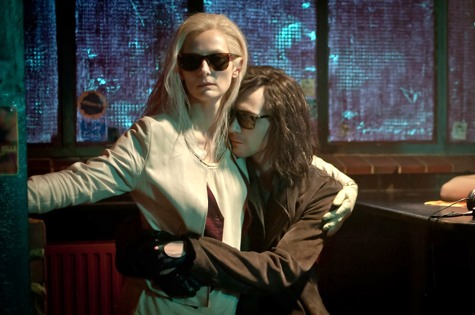When someone tells you that there’s a vampire film starring Tilda Swinton and Tom Hiddleston out now, your first reaction is obviously, “Teleport me to a theater where I can clap eyes on this stunning achievement.” If you’re a fan of Jim Jarmusch’s work, that’s only going to make it more enticing.
But since Only Lovers Left Alive is not exactly on wide release, you might be wondering, “Is it worth it for me to search for a theater playing this film festival gem?” In this viewer’s succinct opinion: Run, do not pace thoughtfully.
For a less abridged version, read on.
Minor spoilers for the film below.
The plot itself is simple enough to summarize without destroying any magic therein: Vampire Adam (Tom Hiddleston) has started to grow weary of the world and the many “zombies” (humans) in it. Aware that his current downward spiral might result in something far more permanent than a good long sulk, his wife Eve (Tilda Swinton) rushes across the world to be at his side and help him through this rough patch. Eventually her blood-addled burnout sister, Ava (Mia Wasikowska), finds them both and brings nothing but trouble in her wake.
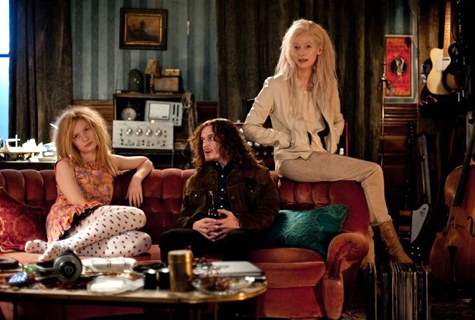
The story is told just as much by music as the actions of characters, and as a result, you might find that yourself in need of the soundtrack immediately following your viewing. The soundscapes “created” by Adam are layered and encompassing, more of a Brian Eno/Robert Fripp mutation than the distressed musings of a tired indie rock poet. The mess that Adam has made of his nest (for it is more appropriate to call it that than a house) in the form of retro recording equipment and antique instruments is enough to make a very specific kind of music geek swoon.
This is a film about cycles: the dizzying rotation of the camera in the opening shots, the spin of a record turntable, Adam’s reoccurring distaste for the world and the people in it, the never-ending loop of addiction, the obtaining and casting off of material goods, trips round the world and back. Even Adam and Eve are a cycle in each other, yin and yang, though here the female aspect is the light with Eve; she is a celebration of life and vibrancy and color and movement. Adam is the dark, concerned with death and pensive stillness and isolation. In one perfect moment the two curve to fit together, and it is the only point in the film where they speak in unison, seeming suddenly to share one mind.
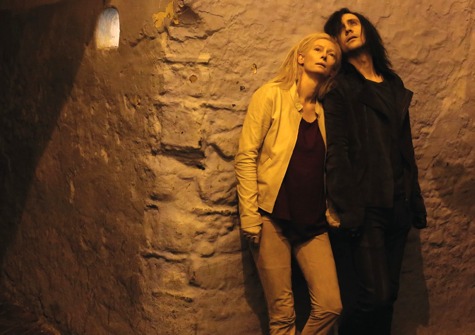
What’s most exciting about director/writer Jim Jarmusch’s worldbuilding in the film is how little he chooses to explain; there are definite rules to vampire culture, but they are never discussed, leaving one to wildly speculate about how things work. The undead crew don’t go out in sunlight (in fact, they wear sunglasses in any bright light at all), they ask permission to cross thresholds (though it’s not essential), they subsist on blood from hospitals and doctors, they can sense the history of an object by touching it. Eve is better at this than Adam, though we’re never sure why. (It is likely her age—apparently in the first draft of the script, Jarmusch insisted that Eve was a 2000 year old Celt from a matriarchal tribe and Adam was only 5-600 years old, though he opted out of having anyone say so in the script itself.) Blood seems to operate on them like a drug, and it’s this addiction that ushers in most of the film’s conflicts and despair.
Also worthy of note is how the film tackles the expected hyper-sexuality associated with vampirekind. Though the whole journey is undoubtedly sensual in the extreme, outside of some tastefully shot nudity, there is no sex shown and very little to indicate it at all. If anything, it seems to make more of Adam and Eve’s relationship; they’ve already been married three times at least, and what they require from each other—even if a piece of that is sexual in nature—is very much beside the point. This means that Only Lovers Left Alive stands apart from cult film cousins like The Hunger, opting out of the more visceral thrills that audiences expect from vampire narratives and instead providing us with considered ruminations on time, comfort in connecting, and the progress of humanity in art and science.
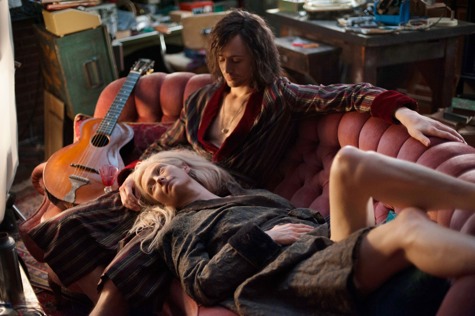
The key is certainly in the title, but it operates on two levels—one might assume that there is a cynical comment being made about love today, that Eve and Adam are the only ones left who truly understand it at all, thanks to centuries of experience. But it seems more accurate to say that with how long they have both lived, the only part of them left that makes their existence a life at all is the love they have for each other. When all is said and done, lovers is their whole identity in the purest sense.
That the performances are spellbinding seems like it should go without saying. The film is a delicious slow burn as paced out, but if the actors were not entirely hypnotizing it would be rendered unwatchable. From John Hurt’s turn as vamped up Christopher Marlowe (with his own secrets to tell) and Jeffrey Wright’s droning delivery as Dr. Watson, to Mia Wasikowska’s despicably childish Ava and Anton Yelchin’s out-of-depth Ian. Tom Hiddleston manages to make Adam’s current bout of difficulty with the world soulful rather than whining, and his wit provides most of the film’s laughs. But it is Tilda Swinton, of course, who transports the film, her every expression simultaneously filled with childlike wonder and ageless wisdom, her bearing the easiest indication that she’s more than a mythical creature—she might as well be from another world entirely.

Landscapes are essential to the tale as well; Eve calls Detroit Adam’s “wilderness,” and what she sees of it makes that an accurate enough description. Even so, Adam has been surrounding himself with relics and death, finding comfort in the birthplace of Motown and car factories, but drowning in its dust. He romanticizes the past, but his desire to be surrounded by it only contributes to his depression. A single musical experience toward the end of the film breathes life back to him, reminds us that something new could be waiting anywhere, ready to entice us.
At the end, you might find yourself wishing that you knew these strange people; their collections of experience prove a worthy teacher for anyone feeling down on the current cultural wheel we are spinning. And if you’re still full of ennui when credits roll, don’t feel down—just one more turn will set you right.
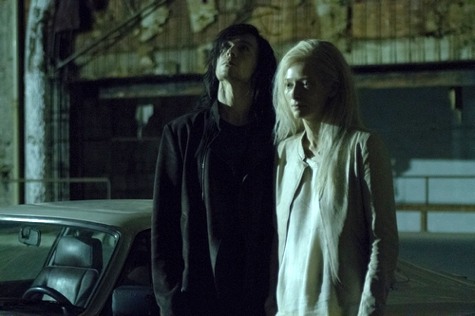
Emmet Asher-Perrin will be over here enjoying some blood out of shot glass. You can bug her on Twitter and read more of her work here and elsewhere.










